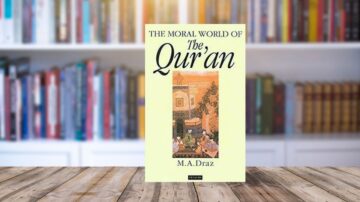Book cover:The Moral World of the Quran – Muhammad Draz’s aim was to fill the gap in the West’s history of moral philosophy created by its ignorance of Quranic ethics.
Author: Muhammad Abdullah Draz. Publisher: I.B.Tauris, 2008 | Pages: 395
About Muhammad Abdullah Draz
Muhammad Abdullah Draz was born in Egypt in 1894, the son of a religious scholar. He attended Al-Azhar, where he later taught. Draz learned French and, in 1936, went to France, where he lived for twelve years. To prepare for his PhD, he took a bachelor’s degree in philosophy. His PhD thesis formed the basis of The Moral World of the Quran, published in French by Al-Azhar in 1947 and later translated into Arabic in 1973. Draz died in 1958.
Overview of The Moral World of the Quran
Draz’s ambitious aim was to address the gap in Western moral philosophy resulting from a lack of knowledge about Quranic ethics. He sought to demonstrate that key moral insights from Western philosophers are implicitly present in the Quran. A reviewer on Arabnews.com noted that, while Draz aimed to show the superiority of Islamic morality, his work remains free of chauvinism and exhibits scholarly disinterestedness. With the work now available in English, it is hoped that it will contribute significantly to Anglo-Saxon philosophical discourse and foster better intercultural communication between Islam and Christianity.
Key Concepts in Quranic Ethics
Central to the book are the chapters on obligation, responsibility, sanction, inclination, and effort. These themes represent the fundamental concepts in moral philosophy as seen through the lens of Quranic ethics. Additionally, the book includes a valuable supplement of Quranic extracts on practical ethics, though this supplement is not directly integrated with the main text.
European Philosophical Influences
Despite focusing on the Quran, Draz primarily employs a European style of philosophizing. He extensively references European philosophers, particularly Immanuel Kant, whose ideas on duty and the categorical imperative provide a framework against which Quranic concepts are measured. This approach is notable as it aligns Islamic ethical thought with the traditions of Aristotle and Thomas Aquinas.
Obligation and the Concept of Duty
Draz, echoing Kant, asserts that any meaningful ethical doctrine is founded on the idea of obligation. He writes, “without obligation there is no responsibility, and without responsibility, there can be no return of justice, whence chaos, disorder, anarchy…” (13). His dialectical, persuasive method emphasizes the importance of duty over mere analytical justification.
He reinforces his point by citing Kant’s claim that duty is the source of moral obligation and the highest faculty of the soul, linking humanity to the rational order. Draz draws parallels between Kantian doctrine and Quranic teachings, notably referring to Quranic verses such as {Do they follow the command of their reason, or is it that they are unjust people?} (Quran, At-Tur 52:32).
Love, Command, and Moral Disposition
In discussing the limits of human obligation, Draz notes that no one is compelled to perform the impossible, quoting the Quran: {We do not burden any soul with more than it can bear} (Quran, Al Anam 6:152). However, his analysis of love—particularly love of God—presents a nuanced debate. Although Draz refers to love as an “emotional and involuntary state,” Islamic teachings via hadith underscore that love for God and one’s neighbor is commanded, suggesting that love is better understood as a cultivated disposition rather than a spontaneous emotion.
Bridging Islamic and Christian Ethics
A major highlight of the work is its demonstration of shared ethical values between Islam and Christianity. Both traditions emphasize the dual command to love God and one’s neighbor, a principle echoed in the teachings of Jesus and subtly endorsed by Draz. Furthermore, Draz acknowledges the Christian doctrine regarding the fallen nature of humanity, noting that when we neglect our duty, we “feel we are lowering ourselves to a position which does not belong to us: we tacitly avow that we are a noble albeit fallen creature” (16). He also affirms that the Quran does not view human nature as intrinsically corrupt, aligning his perspective with Catholic thought.
Practical Application of Quranic Ethics
Draz emphasizes that ethical principles must be applied to real-life situations. This involves interpreting the general moral law within specific contexts, where conscience plays a critical role. Acknowledging the inevitability of occasional misinterpretation, Draz states, “I shall not be held guilty if I have made the necessary effort, which is my own, to enlighten myself” (62). He supports this perspective with Quranic guidance, such as in {But there is no sin (reckoned) against you wherein you err as to this…} (Quran, Al Ahzab 33:5), which discusses the complexities of naming adopted children.
Conclusion: The Enduring Legacy of Quranic Ethics
The Moral World of the Quran serves as a bridge between Islamic and Western moral philosophies, demonstrating that despite their differences, both traditions share a common emphasis on the worship of God and the cultivation of virtue. Draz asserts, “The sacred Book of Islam teaches us that the sole mission for which, not only mankind, but all rational beings—visible and invisible—were created, is to turn towards their Creator in an act of love and obedience” (203). This sentiment echoes biblical commandments found in Deuteronomy 6:5 and the teachings of Jesus, further highlighting the overlap between Muslim and Christian ethics.
Ultimately, Draz’s work provides a rich, comparative framework that enriches our understanding of moral philosophy. It invites readers from diverse backgrounds to appreciate the shared values that underlie both Islamic and Western thought, encouraging respectful interfaith dialogue and cultural exchange.
For more insights on Islamic ethics, Western philosophy, and interfaith dialogue, explore additional articles on our website.
By Robert Houghton

